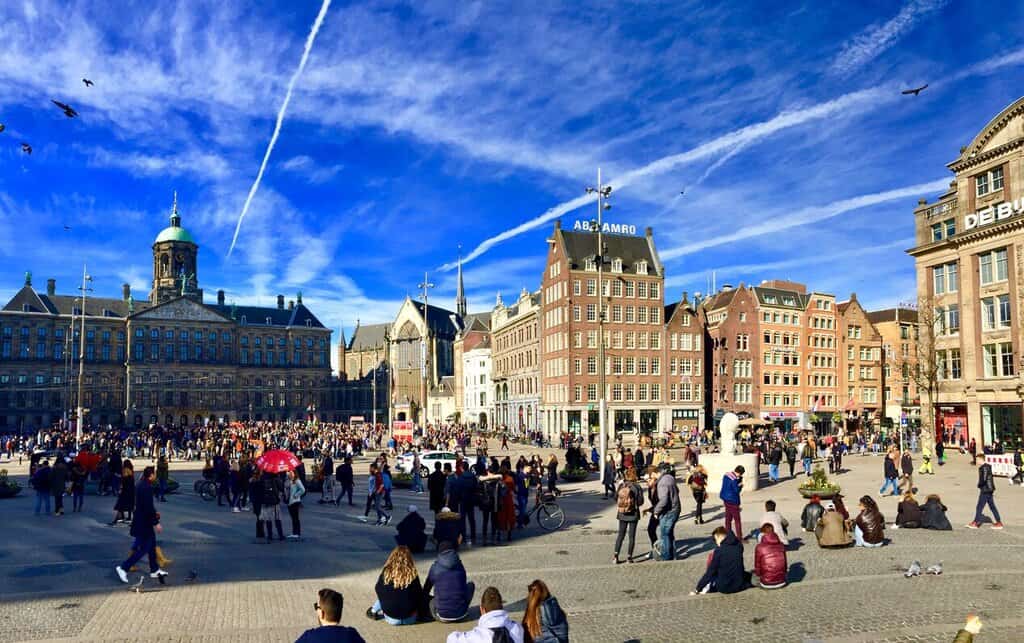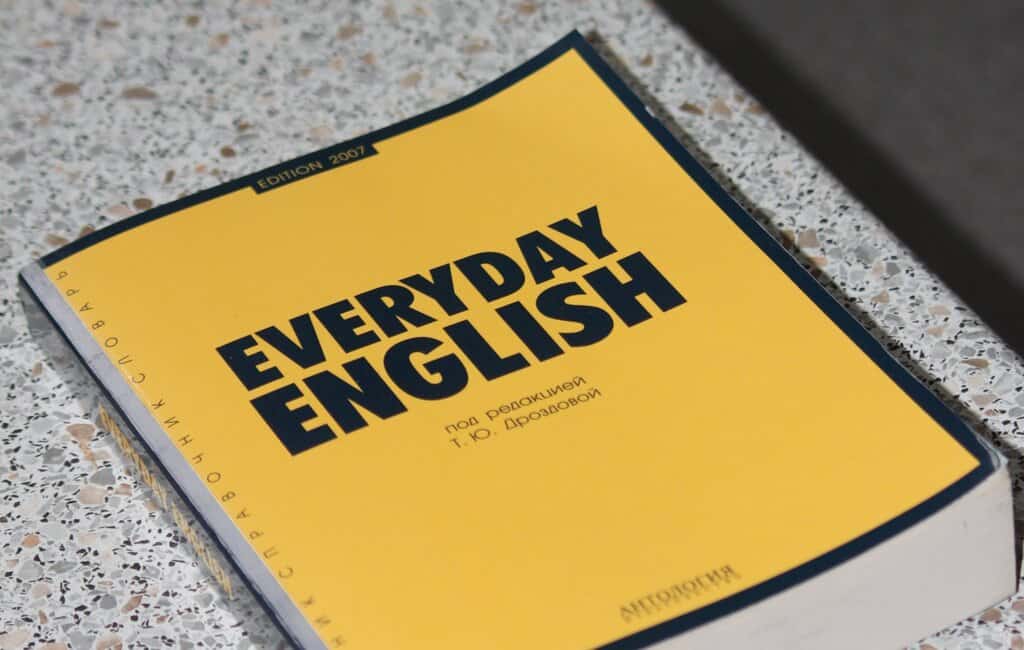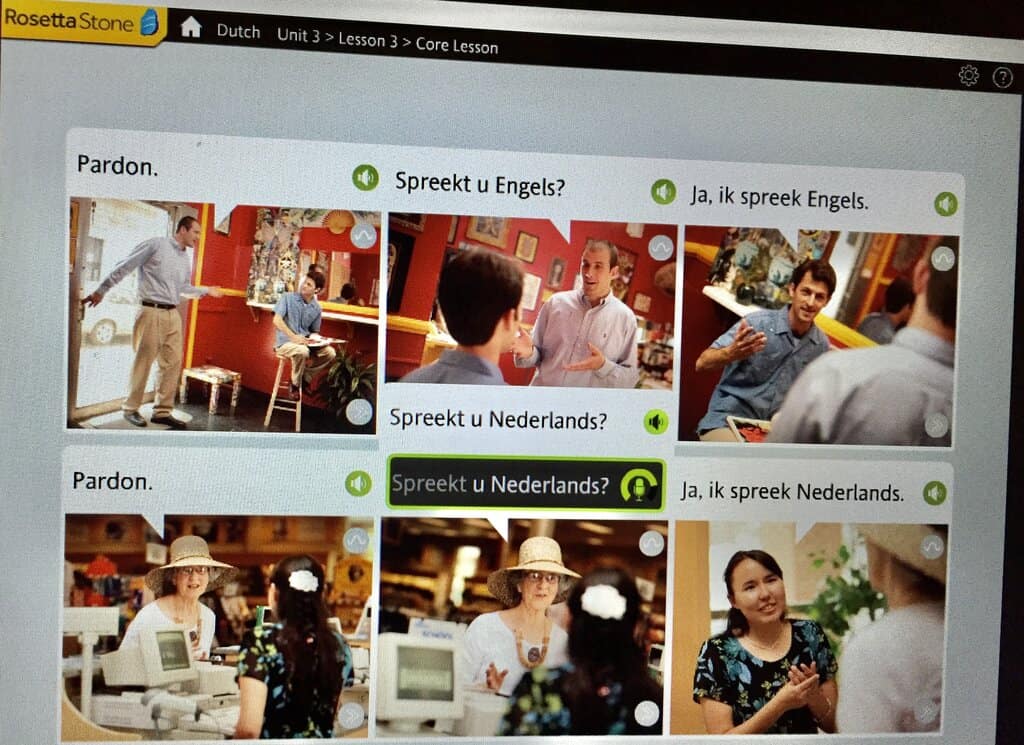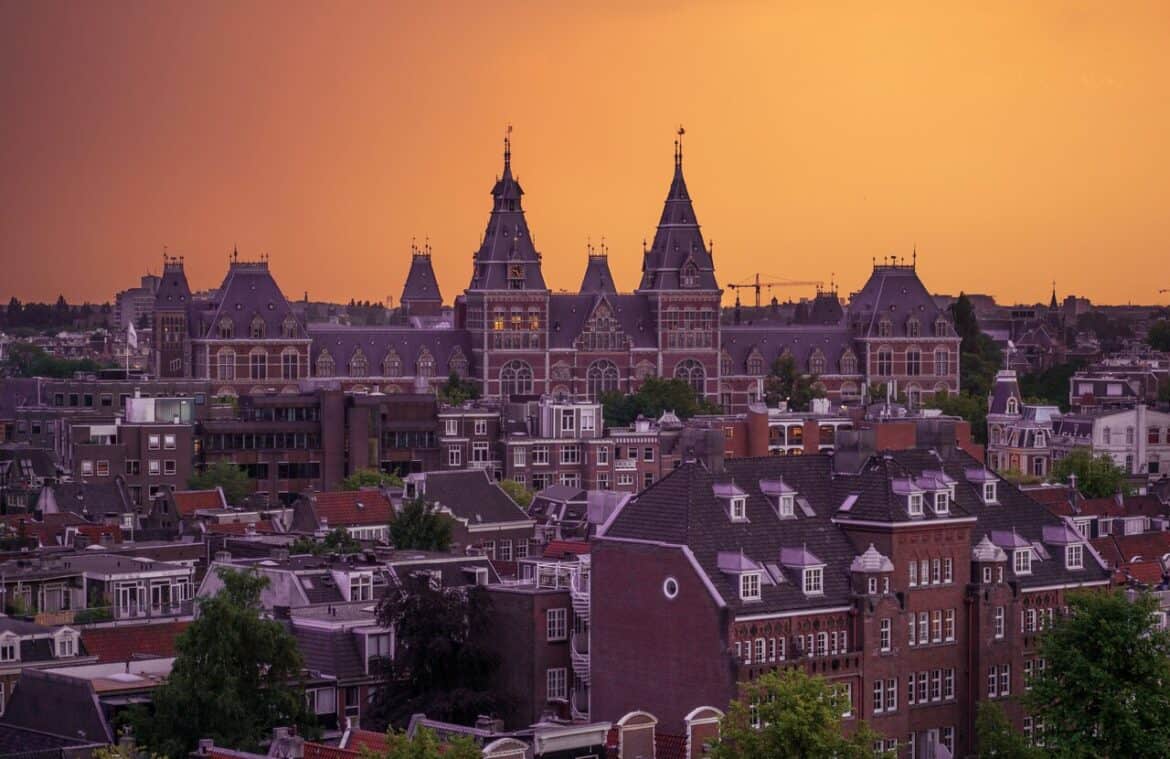If you’re an English speaker getting ready to visit or move to the Netherlands, you might be wondering if English is widely spoken in the Netherlands. With so many different languages across Europe, it’s simply not possible to learn even a little of each on your Euro-trip. You either need to rely on people speaking English, or get used to using Google Translate.
In this article you’ll learn all about how much English is spoken in the Netherlands and how to get by without knowing a word of Dutch, even if you live there.
I spent four years in the Netherlands trying my best to learn Dutch while working as a structural engineer for a global engineering consultancy. I’ve been to every corner of the country and visited dozens of small villages that tourists literally never go to. Basically, you can trust my knowledge of Dutch proficiency in English.
A Trip to The Netherlands
If you’re visiting the Netherlands as a tourist you’ve come to the right place. This website has loads of useful information for planning a trip to the land of tulips and windmills. Start with my 7-day Netherlands itinerary and go from there. You’ll start in Amsterdam, the Dutch capital and a world-class city in every sense of the meaning, before venturing south to lesser known areas of the country.
If you plan on spending decent time in Amsterdam be sure to make some day trips from the city to some amazing nearby destinations, like Giethoorn and Volendam, to name a couple. While the Netherlands is flat and redundant naturally, the Dutch have built amazing cities and farms and really transformed a land with literally no natural resources to a global powerhouse of agriculture and commerce.
Additional Netherlands travel info:
- 25 Tips for Amsterdam first time visitors
- Dutch food and eating in the Netherlands
- The 10 Best Breweries in Amsterdam
- 20 things the Netherlands is known for
- One day in The Hague
- Guide to Amsterdam’s Red Light District
- Groningen Travel Guide
If you found this webpage because you’re planning on not just visiting, but actually moving to the Netherlands then don’t worry. I’ve got you covered too! So now without holding you up and longer, let’s explore the use of the English language in the Netherlands.

Is English Spoken in The Netherlands?
The simple answer to the question of “is English spoken in the Netherlands?” is yes! English is widely spoken all across the country. The rate of English fluency is probably better than in the United States, actually. And by probably I mean definitely.
Estimates for English proficiency in the Netherlands range from about 90-93%. Levels of fluency vary among the native population and fluency also varies geographically. But in general, the Dutch speak great English.
English in Amsterdam and Other Big Cities
English is widely spoken in Amsterdam and other major Dutch cities. Just about everyone in the cities speaks English fluently, often as well as native speakers. In small villages it’s more common to find people who don’t speak English, but it’s rare that you won’t be able to have at least a basic conversation with someone.
Where you’ll find the most struggles with English in Amsterdam and other cities will actually be the African and Middle Eastern immigrant communities. They were pushed to learn Dutch when they immigrated instead of English, which makes sense.
There are also people who speak enough English but aren’t necessarily fluent. They’re often not super comfortable explaining stuff to you but can have a decent conversation.
Our housekeeper in Amsterdam was from Suriname and didn’t speak much English. My Dutch was better than her English so we communicated in Dutch. Though ironically she spoke fluent Hindi (Suriname has a lot of people of Indian descent) so my wife handled most of the communication in Hindi. She could still say basic sentences in English when the three of us were trying to talk though, as my wife speaks no Dutch and I speak no Hindi!
Menus, signs, and other written text
If you’re visiting Amsterdam for tourism purposes, it’s unlikely you’ll encounter anything that is written in just Dutch, other than billboards, advertisements, and that sort of thing.
Menus at restaurants and bars are all bilingual until you get to the outskirts of town where tourists don’t frequent and expats don’t typically live. Signs for things like bus stops and historical sites are also bilingual.
Road signs are typically just in Dutch though. So if you’re driving just be careful if looking for a parking spot and translate the sign first. Most road signs like “stop” and “one-way” are universal so you really shouldn’t have any problems. Just know if something says “niet toegestaan” it means it’s not allowed.
Some popular tourist attractions will also have additional languages, often French, German, and Spanish. Other Dutch cities are similar to Amsterdam in having bilingual written text.
If you’re living in the Netherlands you’ll probably end up in a few places that don’t have English text, like restaurants or smaller Dutch towns that don’t see too many tourists. Even then, if you don’t understand something, you can always ask someone and they’re bound to speak English.
English in the Dutch Countryside
The only time I ever ran into someone who didn’t speak a single word of English was in a small village in the Groningen province, which is the northernmost part of the Netherlands. Out in the real small towns further from Amsterdam, near the German border, you’re more likely to find this sort of thing.
But even then, most of the locals, even in the small villages, will speak enough English to help you out. And you’re probably not keen on visiting a place like Loppersum anyways, are you?
Fluency rates are generally lower in the small villages, as they don’t have as many international companies, students, and expats living there or passing through. The small villages also typically have older populations.
These folks probably didn’t learn English in school and might have worked more blue-collar jobs where there was no incentive to know English. In a quiet Dutch village, all you need to know is Dutch.
So what was I doing in the tiny northern village of Loppersum? Long story short: I worked as a seismic engineer assessing buildings for natural gas induced earthquakes. The epicenter of the gas field was in lovely Loppersum. I’ve been to more small Dutch villages than most expats, I can promise you that!
Why do the Dutch Speak Such Great English?
So why exactly do the Dutch speak such great English? There are many different answers to this question, so let’s break them down here.

The Dutch language itself
One reason the Dutch speak excellent English is the scarcity of the Dutch language itself. There are only about 23 million native Dutch speakers in the world. This includes not only the Dutch, but Belgians in the north of the country and the Surinamese.
Suriname is not exactly a household name. It’s a small country in South America that was colonized by the Dutch. To this day it’s the only country from the Dutch colonial era that still speaks Dutch. South African Caucasians speak a modified form of Dutch known as Afrikaans. And Caribbean islands like Curacao and St. Maarten are not technically sovereign countries, but territories of the Netherlands.
In addition, it’s estimated that about 5 million people speak Dutch as a second language. That brings the total to about 28 million people. Seems like a lot, but on a global scale it’s not really up there. The market for Dutch language media doesn’t make many people rich!
Global trade and corporations
For a small country, the Netherlands is a giant in the world of international commerce. The Dutch export an insane amount of agricultural products, like tomatoes, flowers, and cheese for example.
They also control many global shipping routes and some of the largest and most recognizable companies in the world are Dutch. Shell, Heineken, Philips, Booking.com, KPMG, Unilever, and ASML Holdings all started in the Netherlands. (If you haven’t heard of ASML yet, you will soon. The Dutch company is one of the only companies in the world that makes the machines that make computer chips and as of 2023 they are one of the most valuable companies in the world.)
Being so active on the global stage requires doing business in English, and the Dutch have known this for generations. The incredible amount of international commerce that comes out of the Netherlands is one of the main reasons why the Dutch are so proficient in English.
Television and media
Unlike other major European countries, TV shows and movies are not overdubbed in the Netherlands. They are aired in English with Dutch subtitles.
As we discussed earlier, since the country is small there is not a huge market for a film and music industry. There is one, and you can find shows, movies, and music in Dutch. But the Dutch also love Hollywood and British media as well. And the sheer quantity of media produced in English completely overshadows local Dutch productions.
Due to this, children are introduced to English at an early age, even before they learn it in school. It’s not uncommon to be able to have a conversation with a 10-year-old in English in the Netherlands.
Germanic languages
There are three Germanic languages: German, Dutch, and English. That might sound crazy, as I’m sure you’d consider German and Dutch far more similar than either language is to English. But oddly enough, there are a ton of words that are basically the same in Dutch as they are in English. A few examples:
Milk = melk
Coffee = koffie
Sugar = suiker
Book = boek
Beer = bier
To drink = drinken
To eat = eten
You get the point. While the grammar is completely different, a lot of the words are pretty damn similar.
English in school
Cultural reasons aside, let’s not forget that one of the reasons the Dutch speak such great English is because they are forced to learn it as children. English is compulsory for Dutch kids in public school and it usually starts around age 10 or 11 (depending on the locality).
English becomes more common in school as a student progresses, with many university programs only being offered in English. Come graduate school, nearly all masters programs at Dutch universities are exclusively offered in English.
Expats and international students
The Netherlands has become a popular destination for expats looking for a new life in a new country. The influx of highly educated immigrants has led to more English being spoken around Amsterdam and other major cities. In certain parts of west Amsterdam it’s more common to hear English on the streets than it is to hear Dutch! Dealing with all the expats – who usually share English as a common language – requires mastery of English.
Living in The Netherlands Without Speaking Dutch
You might have found this article because you’re thinking of moving to the Netherlands and you are worried about learning Dutch. By now you’ve learned just how proficient the Dutch are in English and hopefully your worries have been calmed. But let’s go over a few frequently asked questions for expats and immigrants to the Netherlands about language.

Can I live in the Netherlands without speaking Dutch?
You sure can live in the Netherlands without speaking Dutch. You can live in the Netherlands without speaking literally one word of it, a feat my wife managed to accomplish for four years. There will always be someone who speaks English and the Dutch are more than happy to speak English to you (most of the time).
The Netherlands is one of few non-English speaking European countries you can comfortably live in without ever having to know a word of the local language. Some others would be Denmark, Norway, and Iceland. Additionally, these days with modern technology it’s easier than ever to get by without learning any Dutch words.
The Google Translate app is easy and can even read text if you point the camera at it. If you don’t know what something says, you can literally take out your phone and know within a few seconds. Translating long letters and printed documents can be a pain, but it’s totally doable.
Can I get a job in the Netherlands if I only speak English?
Yes, you can get a job in the Netherlands if you only speak English. It all depends on what type of work you do. Many jobs don’t require knowledge of Dutch but many do require English proficiency. Some examples of this would be a server at a restaurant in central Amsterdam or a coder for booking.com. Or my job as a seismic engineer for a large engineering consultancy in Amsterdam.
Jobs that don’t require Dutch are mainly white-collar jobs (especially computer engineering related) or service industry in tourist areas. There are seemingly more jobs for English-only speakers in Amsterdam than there are for Dutch-only speakers.
That all being said, depending on your job it can be quite difficult to progress your career in the Netherlands without speaking fluent Dutch. If you want to get to the top, you’re probably going to fall short if you only speak English. Due to this, many expats end up leaving after a few years as their careers stall, while many others are comfortable with the status quo and accept the lack of career growth for the benefits of living in the Netherlands.
Why not just learn Dutch then, you ask? Good question. Let’s get to the next FAQ.
Is it difficult to learn Dutch?
Yes, it is surprisingly difficult to learn Dutch. As you’ve picked up by now, the Dutch speak excellent English, and this will be your Achilles heel as you try to learn Dutch. Full immersion in Dutch is difficult to obtain, especially if you live in Amsterdam. With the Dutch speaking such great English, you’re hardly ever going to need to communicate in Dutch.
Not being forced into a situation where you have to speak Dutch makes it tough to really learn. Even if you try speaking Dutch, the person you’re dealing with will usually just switch to English to make it easier for them than trying to understand your broken Dutch.
Dutch grammar is also difficult to comprehend if you’re a native English speaker. There are far more verb tenses than you’re used to and understanding the structure of sentences can be daunting if all you speak is English. Native speakers of other European languages might have an easier time, as they also have more verb tenses and masculine and feminine nouns. But my Italian and Greek friends have assured me that it is still very, very difficult.
How long does it take to learn Dutch?
The amount of time it will take to learn Dutch will vary greatly depending on your motivation. How motivated are you to learn? Do you need it for work? Is your partner or spouse Dutch?
The vast majority of expats who take Dutch classes never become fluent. Most give up well before that. With proper motivation and full immersion you could become fluent in less than a year though. This is more common amongst the refugee community than the expat community though. As an expat working a job in English it can be challenging to find the motivation to go above and beyond when learning Dutch.
I would know, as in four years I got just about as proficient in Dutch as classes and online instruction can get you. I could hold standard conversations – albeit very slowly – and read just about anything you put in front of me – again, slowly, but I could do it.
When it came to trying to follow a normal-paced conversation between two Dutch people in real life, however, I just couldn’t do it. My brain couldn’t process it fast enough to keep up with the conversation. I could read a transcript of the conversation, but in the moment, I was completely lost. It was incredibly disheartening after four years to not be able to get over that hump, and I soon gave up just like everyone else.
I still only know of a few people that successfully became fluent in Dutch and all of them either had a Dutch boyfriend/girlfriend or ran a business. Don’t let that get you down though. There are still great benefits to getting to the level I was at. When you get a letter from the tax authorities in the mail and you can actually read it, it’s a good feeling. Until you realize they are asking you for 350 euros for garbage collection!
English in The Netherlands – Final Word
The Dutch are excellent English speakers, better than many Americans and Brits even. There is a long history of international trade and commerce in the country and the Dutch language is not super useful on a global stage. Dutch kids learn English from a young age and it’s pretty much expected that they’re fluent by the time they go to university.
Whether you are visiting the Netherlands or moving there, you can get by just fine with just English. Though I encourage you to learn as much Dutch as you can if you plan on living there!

